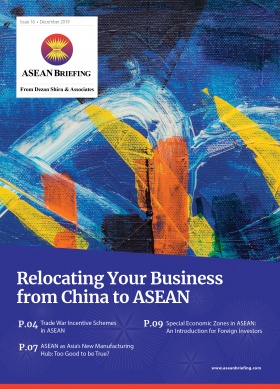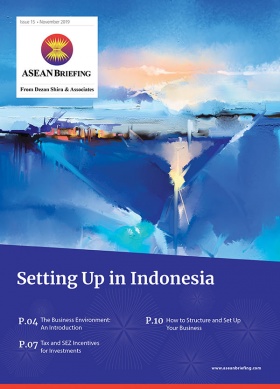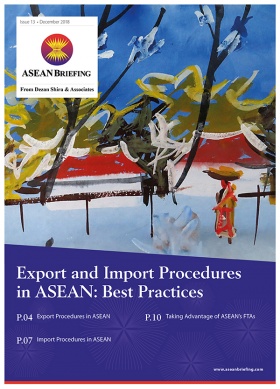Indonesia’s Law on E-Commerce: Clear Guidelines and Compliance by November 2021
- Indonesia’s government introduced GR 80, 2019 in November 2019 aimed at providing legal guidelines for the country’s e-commerce industry.
- The new law requires e-commerce businesses to obtain a business license, report taxes, and uphold consumer protection and rights.
- Foreign e-commerce companies that have a significant ‘economic presence’ in the country will have until November 2021 to be compliant.
In late November 2019, Indonesia introduced its long-awaited law on e-commerce through Government Regulation 80 of 2019 (GR 80, 2019). GR 80, 2019 was issued to improve the governance of internet-based and electronic trading activities in addition to ensuring tax compliance among e-commerce businesses.
The regulation, which will apply to domestic and international internet companies, defines the type of entities that can engage in e-commerce. Additionally, the regulation addresses the specific set up requirements businesses will need to comply with, as well as the framework for online contracts and transactions, and the provisions for consumer right protection. Businesses will have until November 2021 to adhere to the new provisions.What are the entities allowed to engage in e-commerce?
GR 80, 2019 addresses the types of entities that are permitted to engage in e-commerce activities. These are:
- Business practitioners;
- Consumers;
- Non-business individuals; and
- Government agencies.
The term ‘business practitioners’ can be divided into the following categories:
- Merchants (sellers)–business entities or individuals who conduct trade through an ‘electronic system’ which they own or manage directly or through a third party;
- E-commerce providers (PPSME) – any business entity, individual, or government agency that provide facilities or business models that enable e-commerce transactions. These can include:
- Online retail websites;
- Online classified ads;
- Price comparison websites; and
- Daily deal websites.
- Intermediary service providers –business entities or individuals that provide search engine services, hosting services, or caching services.
What are the set up requirements for e-commerce entities?
As per the new regulation, businesses and individuals (domestic or foreign) engaging in e-commerce activities must adhere to several new requirements. This includes obtaining:
- A business license –This is done through the government’s Online Single Submission System (OSS);
- A tax identification number;
- A technical license; and
- A business identification number.
Another key provision of the set up requirement is to prioritize the trade of domestic goods or services, improve their competitiveness, and facilitate a special section or area to promote such goods or services on online marketplaces.
Online marketplaces must also store their data (subscribers, payments, complaints, contracts, shipments etc) in local data centers in addition to having domain names that ‘reflect’ Indonesia (i.e. dot id). Online marketplaces are asked to retain financial data for up to 10 years and non-financial data for five years.Foreign e-commerce entities
Foreign e-commerce businesses or internet companies that have a significant economic presence in Indonesia will be classified as having a permanent establishment in the country, and as such, deemed as an Indonesian tax residence. These entities would need to satisfy the following criteria:
- Reach a certain number of transaction volumes;
- Achieve certain transaction values;
- Achieved a certain volume of packages shipped; and
- Achieve a certain volume of traffic accessing who accesses the businesses’ platform.
Businesses that do fulfill the categories must also appoint a local representative in Indonesia and adhere to all applicable tax regulations.
Tax compliance
Online sellers must now adhere to prevalent regulations regarding income tax. This is governed by Law 30 of 2008 and would mean that online businesses classified as small or medium enterprises (SMEs) must pay 0.5 percent in income tax while large companies pay the 25 percent corporate tax rate. Additionally, individual taxpayers who are earning at least 4.8 billion Rupiah (US$342,000) from their online business must charge their customers value-added tax (VAT).
Consumer protection
GR 80, 2019 states that e-commerce businesses must respect consumer protection and rights as stated in Law 8 of 1999. Furthermore, the regulation addresses more specific protection framework regarding personal data protection, consumer complaints, and dispute resolutions.
Personal data protection
Online marketplaces and e-commerce businesses who collect personal data must follow the data protection standards set out in GR 80, 2019. These include:
- Obtaining personal data in a legal manner;
- Personal data must be accurate and up-to-date, providing the data owner with the opportunity to change the information;
- The personal data obtained must be relevant to what is described in the online marketplace;
- Parties that store personal data must use the appropriate security system to prevent breaches or other illegal uses;
- The personal data collected is prohibited to be utilized or controlled beyond the estimated utilization period; and
- The data collected is prohibited from being transferred or sent to other countries unless the said country has the same standards of data protection as Indonesia.
Consumer complaint services
GR 80, 2019also states that e-commerce businesses must provide a complaint service for consumers. This must include at least:
- The proper procedures that set out the process on how consumers can complain;
- An address and contact number to file complaints;
- Staff that are competent in handling complaints;
- Follow-up procedures for complaints; and
- The time period for resolving complaints.
Electronic contracts
GR 80, 2019, recognizes two types of electronic contracts: purchase agreements and license agreements. For the agreement to be deemed valid and binding, they must abide by the following requirements:
- Must contain information stated in the electronic offer (an offer can be made through emails, websites, and other electronic media);
- Must include the information of the parties involved;
- The contract must be in the Indonesian language
- Include transaction value;
- Payment terms and conditions;
- Details of shipment terms and conditions; and
- Exchange and cancellation policies.
Payments
Online marketplaces are permitted to cooperate with online payment service systems that are authorized by Bank Indonesia (the central bank). Payment service operators are required to maintain the highest standards of security for electronic systems, which is regulated by the Financial Services Authority, the State Cyber and Cryptography Agency, and the central bank.
Import tax
From January 2020, the government will lower the import tax threshold value on consumer goods sold via e-commerce platforms. Goods now worth at least US$3 will be liable for import tax; the threshold was previously at US$75.
This new rule is aimed at controlling the number of cheap foreign products entering the country in addition to protecting domestic firms.
Additionally, there will be different tariff rates for imported textiles, shoes, and bags. Textiles will be subject to 15-20 percent in import duties, as are bags, while shoes will be subject to a 25-30 percent rate. This is also before applying the 10 percent VAT and 7.5 percent in income tax.
Optimizing Indonesia’s digital economy
GR 80, 2019 comes as Indonesia’s internet economy experiences rapid growth with over 10 percent of Indonesia’s 270 million population indulging in online shopping – making the country’s e-commerce industry one of the most dynamic and largest in Southeast Asia.
By issuing GR 80, 2019, the government aims to address underlying issues that have plagued Indonesia’s e-commerce industry, in particular, regarding the legal and tax obligations of online storefronts, and consumer protection guidelines.
The regulation has faced rejection from e-commerce platforms and online vendors who claim that it would discourage small and medium enterprises from expanding online and stifle the growth of the industry; resulting in smaller sellers to shift to social media sites.
However, the legal framework laid out in GR 80, 2019 will be encouraging for foreign investors, who are eager to capitalize on an industry that is predicted to have a gross market value of US$133 billion by 2025.
About Us
ASEAN Briefing is produced by Dezan Shira & Associates. The firm assists foreign investors throughout Asia and maintains offices throughout ASEAN, including in Singapore, Hanoi, Ho Chi Minh City and Jakarta. Please contact us at asia@dezshira.com or visit our website at www.dezshira.com.
- Previous Article Indonesia’s Halal Law Takes Effect, Impacting Products and Services
- Next Article How to Set Up a Representative Office in Vietnam







